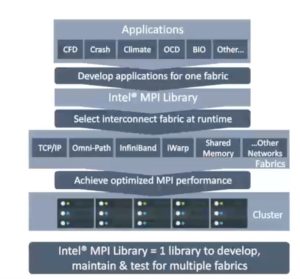 As the trend toward exascale HPC systems continues, the complexities of optimizing parallel applications running on them increase too. Potential performance limitations can occur at the application level which relies on the MPI. While small-scale HPC systems are more forgiving of tiny MPI latencies, large systems running at scale prove much more sensitive. Small inefficiencies can snowball into significant lag.
As the trend toward exascale HPC systems continues, the complexities of optimizing parallel applications running on them increase too. Potential performance limitations can occur at the application level which relies on the MPI. While small-scale HPC systems are more forgiving of tiny MPI latencies, large systems running at scale prove much more sensitive. Small inefficiencies can snowball into significant lag.
To address this challenge, Intel offers several development tools which can help identify and diagnose bottlenecks in application performance and scale. Intel® Parallel Studio XE is available in three editions to meet various developer needs:
- Composer Edition facilitates single node optimization, offers C/C++ and Fortran compilers, libraries, and the Intel® Distribution for Python*.
- Professional Edition incorporates additional tools including the Intel® VTune™ Amplifier, Intel® Inspector, and Intel® These elements provide deeper insights of node-level application optimization.
- Cluster Edition, for large-scale deployments, includes several more tools including the Intel® MPI Library, Intel® Trace Analyzer and Collector, and Intel® Cluster Checker. These supplemental tools help developers understand application behavior by capturing detail about MPI events in an application. A developer can also use filters to hone in on specific information needed and save that detail to a trace file for analysis.
Get insights on best practices for diagnosing applications for the greatest performance on large-scale HPC systems. In this webinar Dmitry Durnov, MPI product technical lead at Intel, discusses the Intel tools which can streamline the process of accomplishing it and features of the Intel MPI 2019 technical preview.




